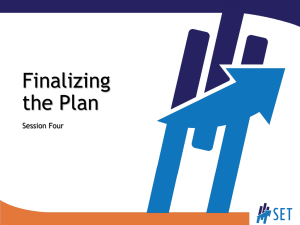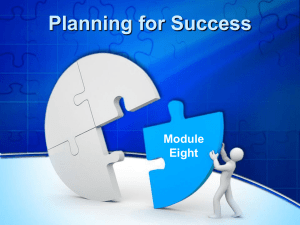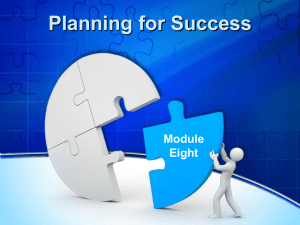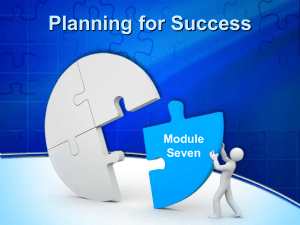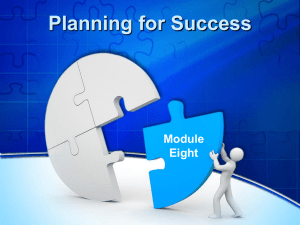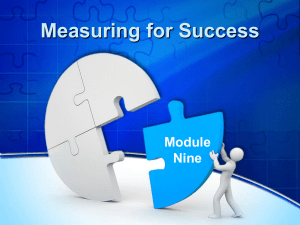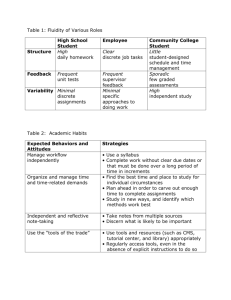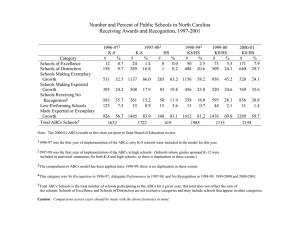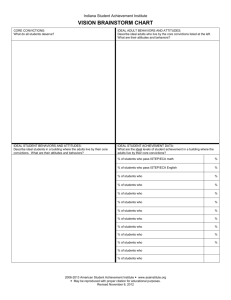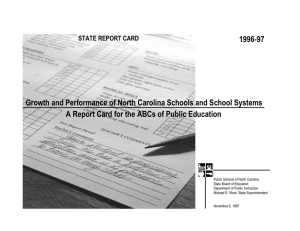Module Eight – PowerPoint Print Version
advertisement
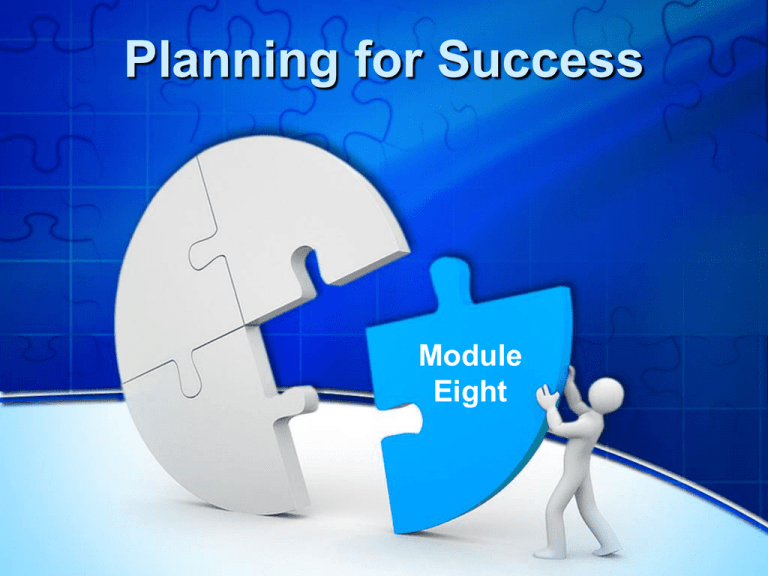
Planning for Success Module Eight Reflecting on the Previous Session • What was most useful from the previous session? • What progress have you made since the previous session (such as homework activities)? • Any other comments or questions about the previous session? Session Overview • Refining the Goal • Identifying the ABCs of Success • Selecting Strategies • Planning for Action REFINING THE GOAL Elements to Consider National & Regional Data Past & Potential Strategies Community Input Regional Goals Regional Assets Potential Barriers IDENTIFYING THE ABCS OF SUCCESSFUL PLANNING Making Changes that Matter Do You Know Your ABCs? Attitudes, Knowledge, and Skills Behavior Conditions Short Term Intermediate Long Term Outcomes Success Moving Forward: Start with the End in Mind Successful planning means thinking with the end goal in mind. Success Condition: Long-Term Outcome Conditions are the overarching changes that you hope to see as a result of your efforts. Changes in conditions take the longest to achieve. How long to achieve? Typically 5 or more years Examples of Regional Conditions • • • • Reducing the unemployment rate Reducing outmigration of youth Reducing rate of poverty Improving the high school graduation rate • Expanding entrepreneurs/small businesses activities • Increasing the number of jobs paying good, livable wages Your Plan: Start with the End in Mind • Imagine that you have been successfully addressing your regional goals for 5 years. • What do you hope is different in your region? • What condition do you hope to change? Conditions Success Behaviors: Intermediate Outcomes Behaviors are concrete actions that individuals or groups take. Conditions change as a result of changed behavior by individuals or groups. These require doing something. How long to achieve? Typically 1-2 years Behavior Changes May Involve: • • • • • Individuals Businesses Government Communities Nonprofits Examples of Individual Behaviors Individuals may need to: • Finish High School • Complete Job Training • Practice Effective Job Skills Examples of Business Behaviors Businesses may need to: • Develop a web presence • Join and participate in a business network or cooperative • Advertise effectively Examples of Government Behaviors Government may need to: • Offer incentives for new/expanding businesses • Create incubators to foster new business growth • Expand services to existing businesses Your Plan: Go back to the condition you identified. What behaviors need to change to reach that condition? Who needs to participate in those changes? Behavior Conditions Success Attitudes, Knowledge, and Skills: Short-Term Outcomes Attitudes, knowledge and skills are elements that individuals or groups can learn or develop in a rather short time. These require “brain power” or new learning. How long to achieve? Typically within the first 6-12 months Individuals May Need To: Attitude/Knowledge/Skill • Believe in the Value of a High School Diploma • Know How to Access Job Training • Learn Job Skills Behavior In Order To: In Order To: In Order To: Work Toward Finishing High School Enroll in Job Training Practice Effective Job Skills Businesses May Need To: Attitude/Knowledge/Skill • Learn How to Create and Manage a Website. • Understand the Benefits of Business Networks • Learn How to Conduct a Market Analysis. Behavior In Order To: In Order To: In Order To: Develop a Web Presence Participate in Business Alliance or Cooperative Advertise Effectively Government May Need To: Attitude/Knowledge/Skill Behavior • Know how to structure • Offer incentives for In Order To: incentives new or expanding businesses • Value the importance of entrepreneurship/ • Create incubators to In Order To: small business foster new business development growth • Learn common factors • Expand appropriate that concern existing In Order To: services to support businesses. existing businesses. Your Plan: One More Step Back In order to get to the behaviors that you want to change, what attitudes, skills or knowledge need to change? Attitudes, Knowledge, and Skills Behavior Conditions Success SELECTING STRATEGIES Outputs: What We Do Outputs Our Regional Team Does Things • Workshops • Counseling • Technical Assist. • Materials To/for/ with People • Clients • Stakeholders • Partners • Businesses ABCs Strategies: Key Questions Which ones will: • Come closest to producing the desired outcomes (ABCs)? • Be most appealing to your target audience? • Make the best uses of resources and strengths (assets)? Help overcome key barriers? • Maximize positive and minimize negative impacts for the region? Your Plan: Select Best Strategies • Weigh all possible strategies • Select best fit to your regional ABCs • Double check the solutions against your asset mapping Connecting the Pieces Should Tell a Logical Story Strategy Attitudes, Knowledge, and Skills Behavior Conditions Success Example Should Tell a Logical Story Strategy Attitudes, Knowledge, and Skills Web training & tech assist. Participants learn the value of website Behavior Conditions Participants build website Participants see increased revenue Success Stronger Small Business Base Your Plan: Checking the Story • Does your strategy match your ABCs? • You should be able to tell a logical story that moves from your strategy, through your ABCs, to the success you anticipate. Inputs: The Engine Inputs = Assets Individuals, organizations, and resources that you will need in order to implement your strategy Your Plan: Inputs • Identify your Inputs: What organizations are contributing? What individuals are contributing? • Are there missing pieces? If so, who can help with these? PLANNING FOR ACTION Developing a Plan of Action Four Key Elements: • Specific steps to be carried out • Person who will take leadership for each step • Realistic timetable for completion of each step • Regular checkpoints to ensure progress & address barriers Your Plan: Gearing Up for Action Final Reflections What are the takeaways from this module? • What topics did you find most helpful? • What did you find confusing? • What do you hope to implement as part of your regional team’s activities? • Other items you want to mention? Homework For each regional goal, complete a: • Planning Chart • Plan of Work These will form the foundation for the final Module: Measuring for Success. Looking Ahead: Module Nine • • • • • Exploring the Value of Measuring Deciding What to Measure Using Measures to Promote Success Tracking Appropriate Measures Creating a Regional Plan for Measuring Success
